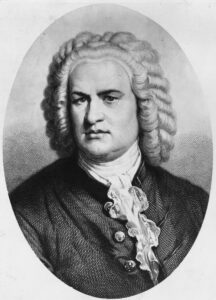I didn’t watch the debate last week. I knew it would make me too anxious, so I made a conscious choice instead to play the piano, my general 9 pm habit. Not knowing anything about the debacle unfolding, I tried to work out knots in a Chopin nocturne and then run through the first movement of the dark and emotional Beethoven Pathetique, giving it all the passion I had as I channeled a niggly unease–perhaps a sixth sense–that things were not going well. What else could be expected from giving a raving liar free liberties to say whatever he wanted without checking a single fact, and knowing that the media instead would be paying the most attention to the other candidate’s slips as warning signs of his age in order to frame that as a more relevant liability?

Circa 1722, German organist and Barouque composer, Johann Unknown source, CC BY-SA 4.0 <https://creativecommons.org/licenses/by-sa/4.0>, via Wikimedia Commons
On January 6, 2021, I was also playing the piano–to try to deflect the horror I was feeling as reports of the Capitol Riot began to filter through. When the World Goes Awry, Play Bach, I later titled a chapter in my memoir. Bach is logical; his music patterned on expectations that never deviate too far from what you might expect. It’s like a calming hand on your shoulder, telling you things will be okay.
I fear we’re living in a “post-Bach” world.
As the pictures and videos plastered the news in the aftermath of January 6, I had to face the nagging question. Why should I be wasting my time playing the piano when there’s so much violence in the world? And now, I’m thinking the same thing as each day inches closer to the possible end of our democracy, especially as the president has just been granted the powers of a king. Is playing the piano any different from the orchestra on the Titanic, fiddling away as the ship went down?
Yet I remember talking with a friend, a visual artist, shortly after the 2016 election. Just do your work–your writing, he said. That’s what we all must do–keep doing our work.
How can we use music, or writing, or painting, any of the arts to channel not only our terror, but our power?
Last night in our poetry critique group, one member presented a chilling and brilliant poem, reminiscent of Sylvia Plath, centering on the psychological effects of the spying on people in East Germany, with only the merest hint of how this was beginning to infiltrate America. The poem was so good, none of us wanted to follow it, but I volunteered. My poem-in-progress contrasted the bleakness of my childhood New York City landscape with my flower garden, exploring through these metaphors themes of aging and the process of acquiring a wisdom that comes hand-in-hand with gratitude, even in times that challenge us and demand our attention to do what we can to make good in the world. It began,
I don’t believe in losing hope
I believe in finding it.
And I do believe we have to keep looking for hope. And that creating art–in any form–is one way of making good in the world, whether you are uncovering horrors, or simply nourishing people by calling attention to beauty and gratitude.This doesn’t mean we can depend on art to change the world on its own, and it doesn’t excuse us from doing more than writing the next poem or making the next painting. ,But art can help us process our deepest feelings, which can enable us to evolve from a state of numbness and shock into a place where we can reclaim our power. And sharing our paintings, photographs, stories with others can also inspire our viewers/listeners to get through their own numbness to a place of action.
What did Arlo Guthrie say? Fifty people a day walking in singing a bar of Alice’s Restaurant and walking out…they may think it’s a movement.
